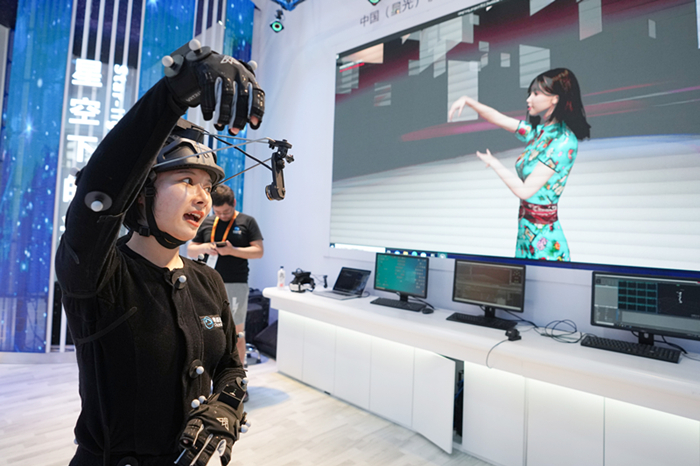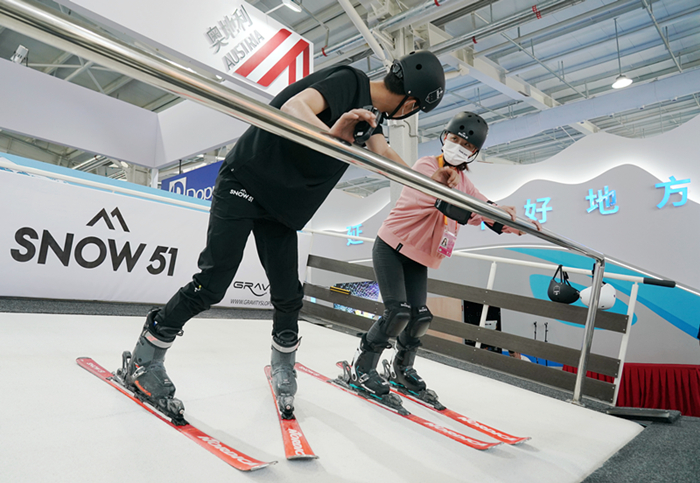|
||||||||||
| Home Nation World Business Opinion Lifestyle ChinAfrica Multimedia Columnists Documents Special Reports |
|
||||||||||
| Home Nation World Business Opinion Lifestyle ChinAfrica Multimedia Columnists Documents Special Reports |
| ChinAfrica |
| Innovation In Spotlight |
| CIFTIS showcases intelligent technology applications in various service fields, providing visitors an immersive experience |
| Edited by Xia Yuanyuan 丨VOL. 14 October 2022 ·2022-09-22 |

An exhibitor demonstrates an optical motion capture system displayed at the CIFTIS at Shougang Park in Beijing, capital of China, on September 1
Application of smart technology is driving the upgrade of service trade, as was clearly visible at the recently concluded 2022 China International Fair for Trade in Services (CIFTIS).
Themed Cooperate for Better Development, Innovate for a Greener Future and held at the China National Convention Centre and Shougang Park in Beijing from August 31 to September 5, the 2022 CIFTIS showcased new technologies, applications, and the potential of global leading enterprises and institutions in the service trade sector.
The fair showed that an increasing number of traditional service trade companies are installing “smart brains” to accelerate their transformation. The displays of VR equipment, 5G, the metaverse, artificial intelligence and the Internet of Things demonstrated their capability of bringing new experience to the industry and consumers.
Intelligent logistics
From tea and noodle soup to fruit, consumers can now make a “one-click order” on their mobile phones, and drones or automatic delivery vehicles will deliver them within 30 minutes.
This is a new scenario of terminal logistics and distribution displayed by technology companies such as Meituan at the fair.
Eight Chinese enterprises engaged in logistics business including EMS, Meituan, and SF-Express have showcased new technologies and equipment at the fair, such as autonomous delivery vehicles, drones and indoor robots for the logistics and distribution fields.
Meituan exhibited its nine hi-tech innovative products for delivery of its goods in the courier service exhibition area. The company has developed solutions for the complete automation of warehousing, sorting, packaging and distribution relying on AI, big data, and robotics.
Autonomous delivery vehicles and drones have been widely used by the company to distribute goods within 3 km in 2,800 cities and counties.
GLP, a global investment manager and provider of data infrastructure, renewable energy and related technologies, showcased a robot-as-a-service solution for smart warehousing, which, in simple terms, hires robots like employees and pays for the number of pieces or orders processed.
Relying on the solution, enterprises can benefit from warehousing robotics and use intelligent and efficient storage, picking, sorting, packaging and other services without having to actually purchase the equipment. This model solves the pain points of high payment costs, high trial and error costs, high maintenance costs, and high exit costs of automation investment, reduces capital investment, and helps enterprises to further reduce costs and increase efficiency.
Cai Chen, senior vice president of GLP’s branch in Shanghai, said that intelligence is an obvious trend in the express logistics industry. Intelligence and digitalisation have become new standards for modern supply chains and their industrial services. It is foreseeable that the combination of the Internet of Things and artificial intelligence will bring transformative development to the operation of the entire logistics industry, Cai said.

Visitors to the 2022 CIFTIS at Shougang Park try out the technologyenhanced skiing simulator on September 1
Digitalisation of construction
Engineering consulting and construction services were one of the fair’s nine thematic exhibitions. Digital, green and low-carbon development has become the transformation direction of the traditional construction industry.
Beijing Construction Engineering Group (BCEG) impressed visitors at its pavilion where the construction of the comprehensive transportation hub of the Beijing Sub-Centre Railway Station could be viewed on livestreaming by an intelligent production and command centre.
The 125,000-square-meter mega project began in October 2019 and, when completed in 2024, will be one of the world’s largest underground transportation hubs.
To make the construction smarter and greener, BCEG has adopted 5G and VR technologies and hi-tech devices such as drones and robots, which have helped to improve efficiency and accuracy and reduce waste.
This is the third time for BCEG to participate in CIFTIS. At present, it has established branches in 31 countries and regions around the world. Since last year’s CIFTIS, BCEG has made new achievements in international cooperation such as the construction of the Dodoma Msalato International Airport in Tanzania.
Virtual experience
After Beijing successfully held Winter Olympics early this year, Chinese people’s enthusiasm for ice and snow sports remains unabated. Digital sports are becoming the focus of the sports industry. As one of the nine thematic exhibitions of the 2022 CIFTIS, the sports exhibition showcased new technologies and products for sports services, while an immersive interactive approach was adopted to increase the interaction between exhibitors and audiences.
In the sports pavilions, visitors could experience emerging sports such as equestrianism, fencing, water paddleboarding, and ice and snow events through AR, VR and other technologies. In addition, astronauts’ space fitness equipment and AR interactive billiards also attracted visitors.
Using the AR/VR displayed at the exhibition, visitors could “experience” the thrill of winter sports such as ski jumping and alpine skiing. A pair of tension-adjustable skiing shoes can help to make skiers feel comfortable on different snowfields.
This year’s sports exhibition is attended online and offline by more than 400 sports brands from countries including Austria, Italy, Japan, Canada and France, with international brands accounting for nearly 68 percent of the total.
Engo-ice from Italy, whose products served the 2022 Beijing Olympic Winter Games, was among the exhibitors. To Shen Yumei, marketing director of the company’s China region, CIFTIS was also an opportunity to discuss with other enterprises the future development direction of science and technology in ice and snow sports.
Data show that by 2025, the total scale of China’s ice and snow industry will reach 1 trillion yuan ($144.73 billion), making it a new growth hot spot.
As the metaverse becomes a new buzzword in the tech world, the 2022 CIFTIS also had a special pavilion for visitors vying for hands-on experience of the latest metaverse technologies and applications to visualise what might be the next phase in the evolution of the Internet.
In 2021, China’s trade in knowledge-intensive services accounted for 43.9 percent of the total services trade volume, up 10.3 percent from 2012.
According to China News Service, the current production value of the metaverse sector in China has exceeded 40 billion yuan ($5.77 billion), mainly due to the focus on entertainment, VR, AR and hardware. In the next five years, the domestic metaverse market is expected to surpass 200 billion yuan ($28.85 billion).
| About Us | Contact Us | Advertise with Us | Subscribe |
| Copyright Beijing Review All rights reserved 京ICP备08005356号-5 京公网安备110102005860号 |